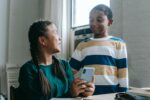The world of education is constantly changing, with new trends emerging all the time. Here are 10 quick educational trends for the upcoming year:
Personalized learning:
Personalized learning is an approach to education that tailors instruction to the individual needs of each student. This can be done through a variety of methods, such as using technology to deliver individualized instruction, or by allowing students to choose their own learning paths.
Microlearning:
Microlearning is a type of learning that is delivered in short, focused bursts. This type of learning is well-suited for the digital age, where people are constantly bombarded with information and have short attention spans.
Gamification:
Gamification is the use of game-like elements in non-game contexts. Gamification can be used to make learning more engaging and motivating for students.
Blended learning:
Blended learning is a combination of traditional face-to-face instruction and online learning. This type of learning offers the best of both worlds, allowing students to benefit from the personal interaction of face-to-face instruction and the flexibility of online learning.
Social-emotional learning:
Social-emotional learning (SEL) is the process of developing the self-awareness, self-management, social awareness, relationship skills, and responsible decision-making skills children need to succeed in school, work, and life.
Maker education:
Maker education is a hands-on approach to learning that emphasizes creativity, problem-solving, and critical thinking. Maker education can be applied to all areas of the curriculum, from science and engineering to the arts and humanities.
Project-based learning:
Project-based learning is a teaching method in which students learn by actively engaging in real-world and personally meaningful projects. Project-based learning can help students develop a deep understanding of the subject matter, as well as important critical thinking and problem-solving skills.
Competency-based learning:
Competency-based learning is an approach to education that focuses on what students know and can do, rather than how long they have spent in school. In a competency-based learning environment, students progress at their own pace and are assessed on their mastery of specific skills.
Global education:
Global education is an approach to education that prepares students to live and work in an increasingly interconnected world. Global education can be integrated into all areas of the curriculum, from teaching about different cultures to developing students’ global citizenship skills.
Outdoor education:
Outdoor education is a type of learning that takes place outdoors. Outdoor education can help students develop a deeper understanding of the natural world, as well as important life skills such as teamwork, problem-solving, and resilience.
Here is a personally resonant tip from Darren, a camping and RV lifestyle enthusiast:
If you’re homeschooling your children or looking for ways to supplement their formal education, consider incorporating outdoor education into your learning. Outdoor education can be a great way to get your kids excited about learning and to help them develop important life skills. There are many ways to incorporate outdoor education into your learning, such as:
- Taking your kids on nature hikes
- Going camping
- Planting a garden
- Visiting a local farm
- Volunteering for an environmental organization
Outdoor education can be a fun and rewarding way for your children to learn about the world around them and to develop important life skills.
FAQ

What are the top 10 quick educational trends for the upcoming year?
The top 10 quick educational trends for the upcoming year are:
- Personalized learning
- Microlearning
- Gamification
- Blended learning
- Social-emotional learning
- Maker education
- Project-based learning
- Competency-based learning
- Global education
- Outdoor education
What are the benefits of personalized learning?
Personalized learning allows students to learn at their own pace and in a way that is tailored to their individual needs. This can lead to better student outcomes and increased engagement.
- Transform Your Health with Medford Medical Weight Loss Program - June 9, 2025
- A Chat with Nate and Mika, Christian Wedding Photographers - July 18, 2024
- Ultimate Guide To Playing Online Casinos - May 27, 2024









